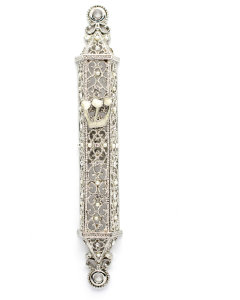The Torah says “…write them [the words of the Shema] on the doorposts (mezuzot) of your house and upon your gates.” The Talmud derives from this verse that the obligation of mezuzah is, in fact, only upon a home or dwelling place. For that reason, a building that is not lived in, such as one’s office, is not obligated in mezuzah. This is with regards to what the Torah requires of us. There is, however, a rabbinic obligation to put one upon the doorway of an office since it is an established dwelling worthy of living in if one would choose to do so. Therefore, we attach a mezuzah there without a blessing. The same holds true with a mezuzah in a synagogue, or for a cottage one only uses for short times for vacations.
A car, however, is not worthy of dwelling at all, and is made strictly for transportation from place to place. Therefore, a car has no obligation, or mitzvah, of attaching a mezuzah at all. Although a mezuzah serves as a symbol of one’s Judaism and one could express that symbol through their car, the symbolic expression of Judaism is not the central meaning of the mitzvah.
Maimonides explains that the Torah’s specification to attach the mezuzah to the doorposts of the home is because the mitzvah is to sanctify the Jewish home. This is done by attaching a reminder of the oneness and majesty of G-d on every doorpost. In this way, every time one passes from room to room, they will be struck by the awesomeness of G-d and reminded of their purpose in this world to serve Him in every aspect of life, even with the most mundane activities performed in the home. Therefore, this mitzvah is strictly defined by a home-dwelling.
The fact that Jewish homes are proudly identified by the mezuzah is a positive by-product of the mitzvah, but not the mitzvah itself. Consequently, there’s no more a mitzvah to attach a mezuzah to a car than there is to wear one around one’s neck. Although anything one does to enhance their Jewish pride is positive, one needs to realize that it’s their own expression of pride, but not the Torah’s mitzvah.
Although a car does not need a mezuzah, there is a fascinating discussion among the Halachic (Jewish law) authorities if a trailer is obligated in mezuzah. A trailer used only for short trips is no different than a car. A trailer which is used, however, as a permanent dwelling, is the subject of this discussion. The question focuses around a ruling in the Code of Jewish Law which states that a dwelling room on a ship is exempt from a mezuzah. Some early authorities maintain that this is because the ship is always on the move and doesn’t constitute a permanent dwelling, which needs to be stationary. Others, however, maintain that if one would live permanently on the ship, the room is obligated even though the ship itself is moving. Based on this reasoning, a contemporary authority ruled that if one lives in a trailer, he should attach a mezuzah. The same ruling would apply to a truck driver who eats and sleeps in his truck on a steady basis.
Sincerely,
Rabbi Yerachmiel Fried



